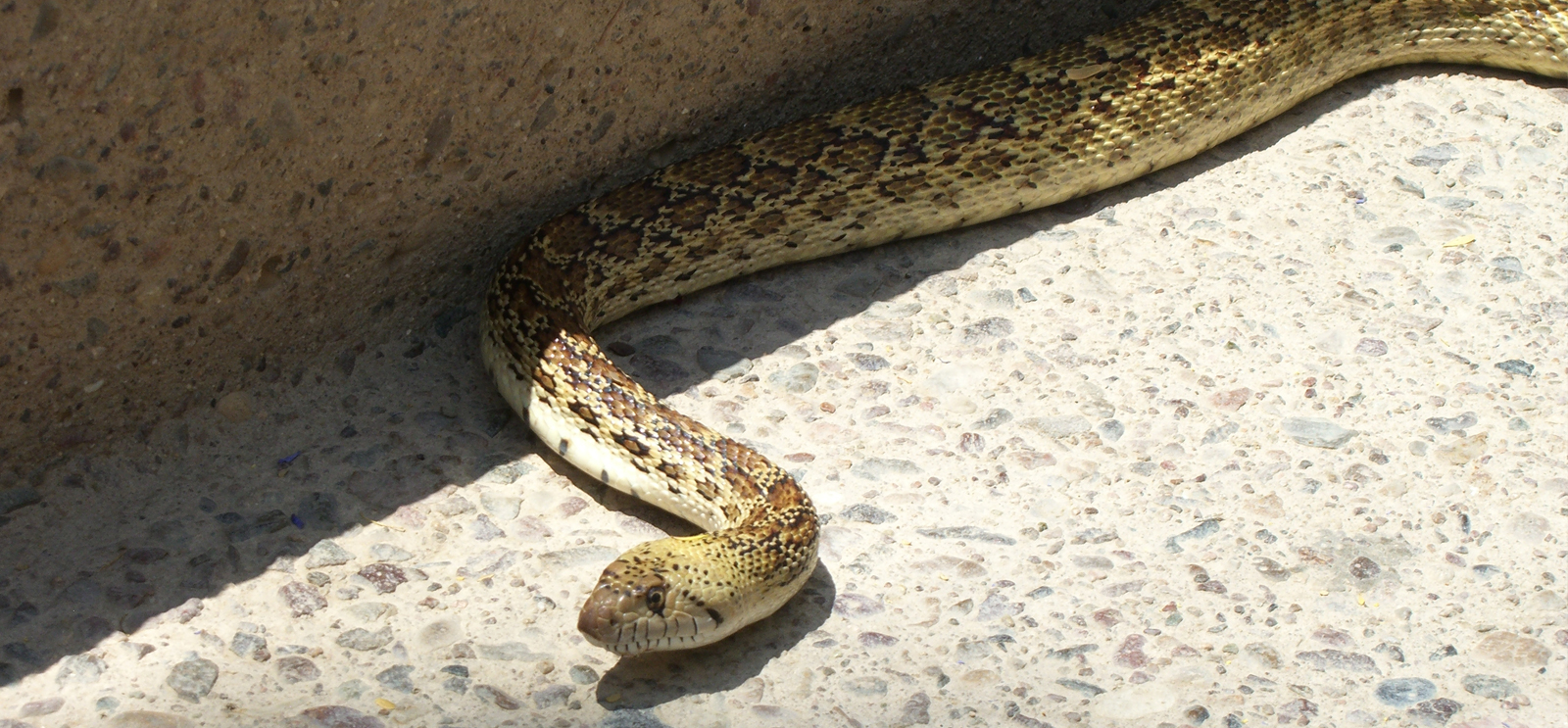
(Photography by Gordon Watts, CC BY-NC 2.0)
From our print archive: A bull snake in 1937 enjoys campus life, “siestas under the Victrola.”
Snakes make the finest kind of pets, according to Professor Durbin Rowland (Romance Languages). They are so little trouble, become so affectionate, and indirectly discourage unwelcome visitors to one’s room.
During the summers of the Century of Progress, Mr. Rowland’s interest in snakes lured him so frequently to the reptile exhibit that the curator, Dr. Scanlan, began feeling guilty about taking his money, so Mr. Rowland was presented with a season pass. A friendship grew between these two men and, at the close of the 1934 season, Dr. Scanlon accepted Mr. Rowland’s invitation to be his dinner guest at the Quadrangle Club.
During the course of the dinner, Scanlan mentioned that he had a package in the check room which he wished to present to Mr. Rowland as a parting gift. When they arrived in the check room they discovered the package rolling toward the opposite wall. (Rowland wondered just how full a full-time professor would have to be to explain this phenomenon!) The package contained a “beautifully marked” (quotes, Mr. Rowland’s) bull snake which had just arrived from Texas.
The snake soon became very fond of its new home and master and led a leisurely life sleeping in his cotton-lined basket by day and enjoying the run of the study by night. His favorite evening retreat was under the Victrola cabinet until the steam was turned off and then he appreciated the luxury of wrapping himself about his master’s arm in order to keep warm. During the year he added two inches to his own four feet, eight. The day came when Mr. Rowland found it necessary to go to the hospital for an operation. Having no friends who felt as he did about snakes, Rowland delivered his pet to the reptile house at Brookfield Zoo for safe keeping. Here the snake soon died, grieving for his former life on the quadrangles and his evening siestas under the Victrola.
Proving his statement that snakes are very little trouble, Mr. Rowland explained that his pet ate two mice every 25 days, required water about once a week, and was content to remain in his basket for days at a time if his master saw fit. He thoroughly enjoyed outdoor hikes in fair weather, however. Mr. Rowland, thinking to give his pet a real treat one weekend, took him to the Indiana dunes and turned him loose on the warm sand. The snake, having neither vest nor shoes, found the sand most uncomfortably hot and rushed wildly from bush to bush seeking cool shade. It was some time before Rowland overtook his irritated pet to rescue him from his uncomfortable predicament. It was a good deal longer before he could convince the young fellow that the stunt was done in a spirit of kindness and not as a practical joke. Justifying his attitude toward this native of Eden, Professor Rowland explains:
“One of the most interesting attributes of the much-maligned reptile is that he is spotlessly clean—cleaner than a cat or dog. His scales are hard and cold like steel and not slimy as squeamish people seem to think. And it is fun to watch the gradual changes in the attitude of the snake in the process of becoming a pet. When fresh from the desert, he coils and hisses and makes ready to strike at the approach of a human. By degrees he learns that no harm is to befall him; he begins to forget to keep you in line with his jaws. And when at last he relaxes enough to stretch nonchalantly near you with no further concern about keeping his eye constantly upon you, then he is pretty well tamed.
“When one gathers him up, he will still hiss and coil—but that is just a habit and doesn’t mean a thing. When you and the snake both come to understand that there is no point in being on any but friendly terms than he is as a good a pet in his way as an Airedale. And he is a darned sight easier to keep. He doesn’t need a license, he doesn’t get distemper, he eats but once every 20 to 30 days, if you don’t want to be bothered you can let him sleep in his basket for days at a time and a well-bred snake doesn’t demand the daily rounds of hydrant-inspection. He is fun to watch when you want him around, and out of sight out of mind.”
